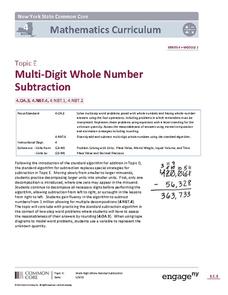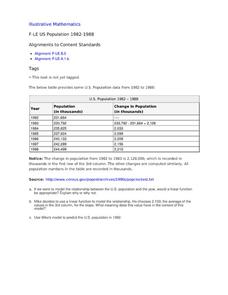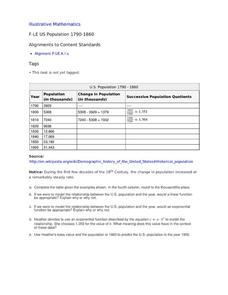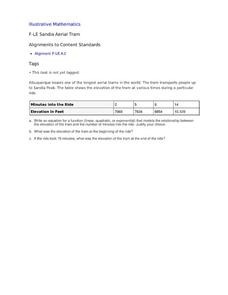Common Core, Inc.
Multi-Digit Whole Number Subtraction
A thorough exploration into subtracting multi-digit numbers, this series of lessons is an excellent way to guide learners of any skill level. With a step-by-step lesson plan and straightforward assessment tools, kids are sure to...
Ed Migliore
Linear Equations in Two Variables
This traditional textbook style unit includes vocabulary, a direct explanation section, examples, practice problems that directly line up with the explanations and examples, and a unit summary review and practice problems. Learners get...
World Mysteries
Pascal’s Triangle and Sierpinski Triangle
Your learners will enjoy this one-page, color-coded poster containing Pascal's triangle and its connection to Sierpinski's triangle. By coloring odd numbers orange and even numbers green on Pascal's triangle a pattern evolves,...
Curated OER
Why Does SAS Work?
Your geometry learners are guided by questions that help them use the language of reflections to explain the Side-Angle-Side congruence between two triangles in this collaborative task. Given a sample solution, declaring the triangles...
Curated OER
Why Does ASA Work?
Your geometry learners explore Angle-Side-Angle congruence in this collaborative task. The sum of the interior angles of all triangles being one hundred eighty degrees, is the key learners will discover as they explain their reasoning...
Curated OER
Symmetries of a Quadrilateral II
Learners investigate the symmetries of a convex quadrilateral in a collaborative activity. Rigid motion and complements are explored as learners analyze different cases of reflections across a line.
Curated OER
Symmetries of a Quadrilateral I
Learners examine the properties of quadrilaterals from the point of view of rigid motion. Different types of quadrilaterals are characterized by their symmetries, so learners explore the symmetries of a described quadrilateral to...
Curated OER
Tangent Lines and the Radius of a Circle
Your Geometry learners will collaboratively prove that the tangent line of a circle is perpendicular to the radius of the circle. A deliberately sparse introduction allows for a variety of approaches to find a solution.
Curated OER
US Population 1982-1988
Your algebra learners make predictions using the concepts of a linear model from real-life data given in table form. Learners analyze and discuss solutions without having to write a linear equation.
Curated OER
US Population 1790-1860
Your young population scientists analyze a table of values, write a model to represent the real life data, finish the table of data and predict future populations in a collaborative, real-life activity.
Curated OER
Rumors
Your young gossipers write an exponential function for the number of people who have heard a rumor after a number of days have passed. Learners then answer a series of questions, including whether or not the solutions are realistic by...
Curated OER
Snail Invasion
Exponential growth is modeled by learners as they analyze and interpret the data presented in this real-life scenario centered on the destructive invasion of the Giant African Land Snail. Learners get a touch of history and practice...
Curated OER
Sandia Aerial Tram
Your learners analyze a table of real-life data in order to write an equation that best models the information. Exponential, quadratic, and linear rates of changes are all possibilities in this task.
Curated OER
Rising Gas Prices – Compounding and Inflation
Financial literacy skills and exponential models are connected by the compound interest formula in this task centered on inflation calculations. Collaborative learners get experience collecting data from the given websites and exploring...
Curated OER
Newton's Law of Cooling
Your Algebra learners analyze and solve an exponential equation in this popular, real-life model of the cooling of a liquid.
Curated OER
Linear or Exponential?
Your learners analyze various real-life contexts to decide if each is a linear or exponential model. This could be used as an assessment of learners' skills of discerning between a linear and an exponential model.
Curated OER
Linear Functions
Your learners will explore linear functions by analyzing a graph of the linear equations.Then learners analyze through calculating f(x+P) and g(x+p)
Curated OER
In the Billions and Linear Modeling
Your learners analyze population data to discern if it best fits a linear scenario. The idea of change by equal differences over equal intervals is enforced in this real-life task.
Curated OER
In the Billions and Exponential Modeling
Modeling population growth gives learners an opportunity to experiment with real data. Comparing the growth rates in this real-life task strengthens learners' understanding that exponential functions change by equal factors over equal...
Curated OER
Interesting Interest Rates
Your young bankers compare earning interest accumulated yearly and monthly to decide which method most increases their balance. Using an exponential function to model the bank balance affords the learners more practice connecting these...
Curated OER
Exponential Growth Versus Linear Growth I
Your algebra learners will discover how quickly an exponential function value grows compared to a linear function's value. Making a table of values helps in this comparison, set in the context of making a wage for raking leaves.
Curated OER
A Saturating Exponential
Your learners analyze the familiar model of a cold beverage warming when it is taken out of the refrigerator. The general form of the equation and its graph are presented. Learners learn about the specific pieces of the function by...
Curated OER
Exponential Growth versus Polynomial Growth
Your algebra learners explore the values of two types of functions in order to compare growth rates in this short cooperative task. Two types of solutions are given, using a table of values and an abstract argument.
Curated OER
Exponential Growth versus Linear Growth II
Your algebra learners discover that exponential functions, with a base larger than one, outgrow linear functions when the inputs increase sufficiently. Their analysis includes using a graphing calculator to produce tables.

























